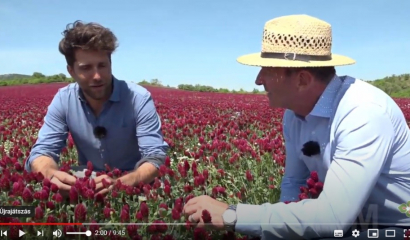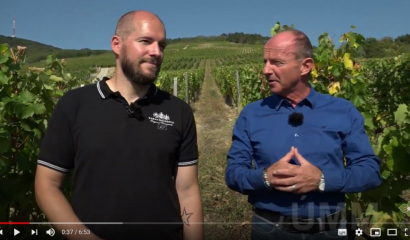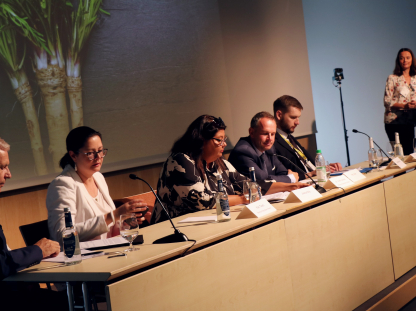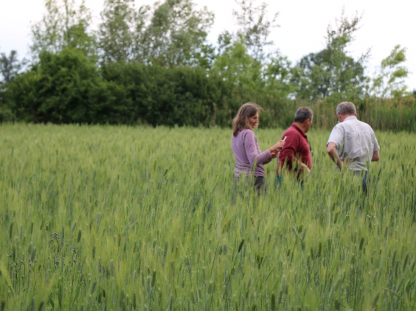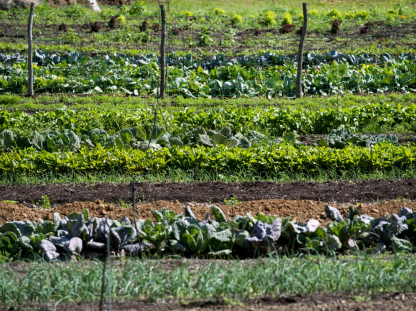Choose ORGANIC! Choose local!
Outstanding Hungarian producers and produce in the service of organic farming
As the festive period approaches, we’re beginning to take a look at some of our favorite Christmas recipes. We know from our grandmothers, and from the renaissance of Hungarian gastronomy, that the key to a delicious and nutritious festive menu is top-quality ingredients. What should be on the Christmas dinner table if you want great-tasting, healthy food? The Research institute of Organic Agriculture (ÖMKi) has been conducting research in sustainable agriculture in Hungary for nearly a decade, and its network includes some of the best organic producers, both in Hungary and abroad. Their experience, commitment and principles tell us that it’s worth buying guaranteed organic, high-quality ingredients, both for Christmas and for everyday cooking. The farmers we’ve met over the course of our research tend their crops and their land with love and care. The seven-part short film series shows who they are, and why they chose to dedicate their careers to producing the best domestic produce on their organic farms.
Organic food is more valuable because chemical pesticides and fertilizers are not used in its production – they are generally unprocessed or lightly processed, and involve limited use of additives or preservatives. Several comprehensive studies have shown that organic produce contains higher levels of trace elements, vitamins and antioxidants. However, fewer people are aware that organic farming is also much better for the soil, feeding valuable nutrients back into it on a regular basis through the use of organic fertilizers and leguminous crops. At the Csoroszlya farm, in the foothills of the Vértes Mountains in Western Hungary, a quarter of the land is sown with crimson clover, which feeds valuable nutrients back into the soil, while also providing a wonderful source of nectar for bees. The farm mainly grows organic grain, and is a supplier of potatoes to some of the best restaurants in Budapest.
Organic farming and the consumption of organic products are not just great for human health, their consumption can also be seen as an act of environmental protection, which contributes to the conservation of biodiversity, the increase of soil fertility and the preservation of non-renewable resources. And biodiversity has now become the primary determinant of our planet’s wellbeing, as the wise environmentalist Sir David Attenborough put it in his recent film, A Life on Our Planet, and as Jane Goodall emphasized at the opening of this year’s Biofach International Organic Food and Organic Goods Exhibition.
Dr. Dóra Drexler, the Director of the Research Institute of Organic Agriculture in Hungary, puts it this way:
“Wisdom can also be found here at home, among the farmers who, with heart, experience and hard work, go out onto the land every day, caring for the crops and animals on their organic farm. We consider it very important that as many people as possible become aware of their good example, personality and work. Our short film series shows who they are and why they have chosen their profession. The Research Institute of Organic Agriculture supports their work by creating an on-farm research network which is unique in Hungary, to share and further develop sustainable farming technologies, and to disseminate the results of scientific experiments.”
The Dezsény family made a decision to move from the city to the slopes of the Cserhát mountains in Northern Hungary. There they grow many types of vegetables: 50 different species and 150 varieties, as the film explains. They have proven varieties, well-yielding, disease resistant ones with great taste, and some that they just fell in love with. As for the farming itself, while it’s sometimes a struggle, they feel they’ve finally found their true home. The produce they grow are given to members of the community which finances the activities of the farm. In return, members gain access to fresh, crisp, healthy, organic crops in the form of ‘vegetable shares’.
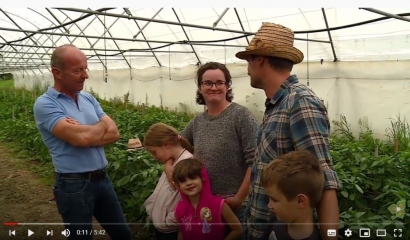
The MagosVölgy Organic Farm is funded by members who sign up for at least one season, and in return receive vegetables on a weekly basis
Organic wines on the Christmas dinner table
The selection of wines from Hungary is abundant and diverse, and there are an increasing number of organic producers. Who would have thought that among wines from the Somló region, organic is slowly overtaking conventionally produced wine? In the ÖMKi video, the director of tourism at the Kreinbacher estate and the president of the Nagy-Somló Wine Region Community explains his dream of converting as much of the region as possible to organic viticulture and winemaking, and how the producers in the region are supported in this endeavor.
In Tokaj, a deservedly famous wine region of Hungary, we can also find many producers where every single bottle of the furmint variety so typical of the region is from an organic vineyard, as explained in the short film about the Hétszőlő estate.
Whether it’s organic red pepper, GMO-free, organic soybean cultivation or the improvement of the sandy soil around Bugac with the help of organic animal husbandry, the featured domestic producers all meet the Europe-wide standard of organic production.
Why can you trust organic?
The multi-year process of transitioning to organic farming, and the abidance of the mandatory regulations, are strictly controlled and certified, also in Hungary. For all land used in crop production, the conversion to organic farming takes at least two years. All relevant rules must also be kept during this period. The ‘waiting period’ ensures that organic products are less likely to contain trace pesticide residue from the former period. The produce grown during this waiting period is treated separately, and is not sold as organic. Animal-based products can be certified as organic only after a conversion period specific to that species and product. The certification and inspection of organic farms are carried out by recognized Hungarian organizations, Hungária Öko Garancia Kft. And Biokontroll Hungária Nonprofit Kft., whose operation is inspected by the National Food Chain Safety Office (NÉBIH).
What’s good for the environment is good for you too!
Organic farming is about much more than just being chemical-free. The basic principle is that the cultivation of plants should be done in harmony with the conditions in the place they are grown, and the breeding of livestock should not impede either their natural movement or behavioral needs. The principles of organic farming include the protection of human health and the natural environment, so they do not use, for instance, GMOs or their derivatives (not even in animal feed). The production methods of organic farmers who grow organic produce maintain the purity of our waters, help increase soil fertility, and have a much lower environmental impact than chemical-based agriculture. Yields in organic production are lower than in chemical-based agriculture, by a proportion that depends on the sector and the place of production, but the 10-20% difference is more than offset by higher quality and the higher sales prices based on the growing demand on the European market. Fortunately, by buying directly from the producer, or even growing it ourselves, organic food is available to more and more people across Hungary.
How can I find organic?
The official term in Hungary is “product of organic agriculture,” which is equivalent to the terms bio/ecological/organic used in everyday language. The standardized European symbol on the packaging is a green background with a series of white stars in the shape of a leaf, supplemented by the code of the certification body which certifies the product. The domestic certifiers are Biokontroll Hungária Nonprofit Kft., which is shown with the code HU-ÖKO-01 and Hungária Öko Garancia Kft. which has the code HU-ÖKO-02. All operators in the production and distribution of organic food are certified companies, i.e. certified by one of these organizations. At markets, vendors of organic food must have valid documentation which certifies them. At an organic market, all vendors must certify their products.
Who is behind ORGANIC? // Producers and products in the service of Hungarian organic agriculture: ÖMKi short film series, produced in collaboration with New Agricultural Magazine (ÚMM)
The production of the film series was made possible by the Hungarian National Rural Network (MNVH).
Cover photo source: Magosvölgy Organic Farm
